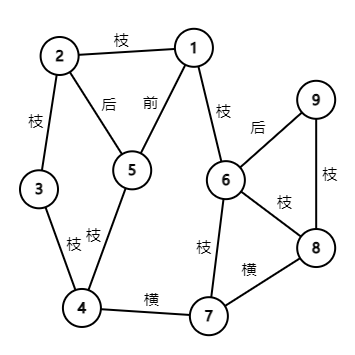【算法-图论】Tarjan
读音
其实 j 不发音,这个读“塔扬”。无向图
缩点
割点
#include <bits/stdc++.h>
using namespace std;
const int man = 2e4+10, mam = 1e5+10;
class Graph {
public:
int hed[man], len = 1;
int nxt[mam<<1], to[mam<<1];
void Ins (int u, int v) {
to[++len] = v;
nxt[len] = hed[u];
hed[u] = len;
return ;
}
} G;
int n, m, rt, cnt, res;
int dfn[man], low[man], cut[man];
void tarjan (int x) {
dfn[x] = low[x] = ++cnt;
int f = 0;
for (int i = G.hed[x]; i; i = G.nxt[i]) {
int t = G.to[i];
if (!dfn[t]) {
tarjan(t);
low[x] = min(low[x], low[t]);
if (dfn[x] <= low[t]) {
++ f;
if ((f>1 || x!=rt) && !cut[x]) ++ res, cut[x] = 1;
}
} else low[x] = min(low[x], dfn[t]);
}
}
int main () {
#ifndef ONLINE_JUDGE
freopen("test.in", "r", stdin);
freopen("test.out", "w", stdout);
#endif
scanf("%d%d", &n, &m);
for (int u, v, i = 1; i <= m; ++ i) {
scanf("%d%d", &u, &v);
G.Ins(u, v), G.Ins(v, u);
} for (int i = 1; i <= n; ++ i) if (!dfn[i]) rt = i, tarjan(i);
printf("%d\n", res);
for (int i = 1; i <= n; ++ i) if (cut[i]) printf("%d ", i);
return 0;
}
一些定义

\[Pic _1
\]
有向图
一些定义
这里分为 \(4\) 种边:
- 树枝边:搜索树上的边;
- 前向边,即在搜索树上 \(x\) 是 \(y\) 的祖先;
- 后向边,即在搜索树上 \(y\) 是 \(x\) 的祖先;
- 横叉边,除以上情况外的边(满足 \(dfn_y < dfn_x\))。
单跑
定义:每个点只取一次的点叫做单跑(不规范叫法)。
#include <bits/stdc++.h>
using namespace std;
#define pii pair<int, int>
#define mp(x, y) make_pair(x, y)
const int man = 1e4+10, mam = 1e5+10;
class Graph {
public:
int hed[man], dis[man], len;
int nxt[mam], to[mam];
void Ins (int u, int v) {
to[++len] = v;
nxt[len] = hed[u];
hed[u] = len;
return ;
}
} G, Gs;
int n, m, a, p, cnt, rec, res;
int dfn[man], low[man], ins[man], c[man];
int in[man], dis[man];
stack <int> s;
void tarjan (int x) {
dfn[x] = low[x] = ++ cnt;
ins[x] = 1;
s.push(x);
for (int i = G.hed[x]; i; i = G.nxt[i]) {
int t = G.to[i];
if (!dfn[t]) {
tarjan(t);
low[x] = min(low[x], low[t]);
} else if (ins[t]) low[x] = min(low[x], low[t]);
} if (dfn[x] == low[x]) {
int y; ++ rec;
do {
y = s.top(); s.pop();
ins[y] = 0, c[y] = rec;
Gs.dis[rec] += G.dis[y];
} while (x != y);
} return ;
}
void topo () {
memset(dis, 0, sizeof(dis));
queue <int> q;
for (int i = 1; i <= rec; ++ i)
if (!in[i]) dis[i] = Gs.dis[i], q.push(i);
while (q.size()) {
int x = q.front(); q.pop();
res = max(res, dis[x]);
for (int i = Gs.hed[x]; i; i = Gs.nxt[i]) {
int t = Gs.to[i];
dis[t] = max(dis[t], dis[x]+Gs.dis[t]);
-- in[t];
if (!in[t]) q.push(t);
}
} return ;
}
int main () {
scanf("%d%d", &n, &m);
for (int i = 1; i <= n; ++ i) scanf("%d", G.dis+i);
for (int u, v, i = 1; i <= m; ++ i)
scanf("%d%d", &u, &v), G.Ins(u, v);
for (int i = 1; i <= n; ++ i) if (!dfn[i]) tarjan(i);
for (int i = 1; i <= n; ++ i)
for (int j = G.hed[i]; j; j = G.nxt[j]) {
int t = G.to[j];
if (c[i] != c[t]) {
Gs.Ins(c[i], c[t]);
++ in[c[t]];
}
}
topo();
printf("%d", res);
return 0;
}

